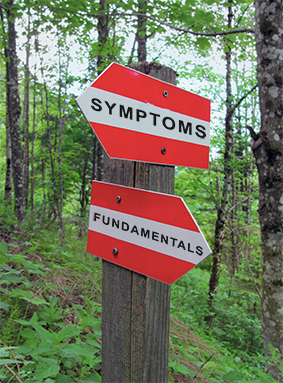Faced with a problem, should we focus on symptoms or on the fundamentals that generate those symptoms?

What does your common sense tell you? In practice, we know that it is often a difficult choice.
THEE was developed with the belief that a scientific identification of fundamentals in personal life was possible. It differed from the usual social science approach in making the focus of observation (and validation) people in the midst of committed action. A person who is committed is an entirely different being from a subject in a psychology experiment or a random respondent in a social survey. Is focusing on reality as it is created and lived too hard? No—it's only unusual.
Taking this approach to the fundamentals of social life led to the discovery of frameworks of elements intrinsic to being human. Over time, the similarity and connections between these frameworks revealed that there was a deep order to the elements in psychosocial reality: an ontology or taxonomy was being revealed. It was apparent from early on that use of THEE frameworks can release creativity, while being wholly practical and socially beneficial. So why aren't they used more?
One reason is that when taxonomic principles are violated, the symptoms cry out for someone to «do something»: or these days to «do whatever it takes». The consequences in the longer term may be utterly disastrous, but there's no time and little wish during the crisis for addressing fundamentals.
It wasn’t all that long ago when a visit to the doctor meant taking your life in your hands. As a patient, you brought along your symptoms, but much of what was done was positively harmful: think blood-letting! That didn't stop the doctors. So our leaders are acting in a well-established tradition. No one should be blamed. It required medical science to indicate what interventions were sensible: progress came from understanding anatomy, physiology, and pathological processes.
Now let us look at the social and organizational scene. When there are problems in society, do politicians address symptoms or deal with fundamentals? Do they do more harm than good, like the doctors of old? The answer to the first question determines the answer to the second.
Let’s take just one example from the recent social scene:
Gross failure of regulators. Are more regulation and reorganization of the regulatory system addressing the symptom or the fundamentals? If regulators failed now, why should they succeed in the future? Harmful political control of regulators is routine, and capture of regulators by the industry they are supposed to regulate is the norm. Many staff come from the industry and/or go on to work for the industry. So new regulators and new complex regulations are the opposite of what is required. Regulation is surely required, but recognize that the present political response to regulatory failure is the equivalent of blood-letting.
Let’s look at a common phenomenon in organizations:
Managerial failure. A recently employed manager becomes apathetic and loses enthusiasm. Is that a fundamental? Or a symptom? If the manager started full of energy and ideas, then what might be behind the change? It could be his boss endlessly criticizing and bullying him. But that solves nothing: why is his boss like this? What can be done? Clearly, it is not possible to develop a solution without going into the fundamentals of that organization’s culture, its methods of setting up managerial relationships, and similar issues. Popular blogs with titles like 5 Tips to Be a Good Boss do not provide anything that resembles a practical understanding of fundamentals.
In order to deal with fundamentals rather than symptoms in personal and social life, you need the knowledge equivalent to:
- anatomy—i.e. all the elements in psychosocial reality
- physiology—i.e. all the relations and interactions between those elements, and
- pathological processes—i.e. what sorts of malfunction are liable to develop.
Developing such knowledge is a conventional scientific endeavour in an unconventional field of inquiry. Findings will never emerge from neuro-imaging the brain or lab-based cognitive studies. They come from studying ourselves and others as we go about our lives in a committed fashion. In doing so we create psychosocial reality: the world of purpose, value, communication, prosperity, compromise, science, and everything else non-physical. These matters have been observed over the millennia in some topics, and with much greater focus in recent times on others. But the modern orientation has been generally back to front: measuring before understanding what can and should be measured, theorizing before getting clarity about what exists to be explained.
For over three decades, many (but by no means all) fundamentals underpinning organizational and social situations of every possible sort have been specified and taxonomically ordered within THEE. This project will certainly not lead to utopia, anymore than medical science has led to a world of perfectly healthy people. However, THEE does provide the wherewithal to prevent mindless reactions and simplistic solutions to complex systemic problems. It opens the door to thoughtfulness and the art of the possible. It provides the basis for meaningful conventional research.
Have you ever seen Gray’s Textbook of Human Anatomy—the classic tome now in its 40th Edition? It’s massive. So would you expect the anatomy of our psychosocial reality to be summarized in a few blogs? It's a world of study: a lot has been discovered, but a lot more inquiry is needed.
Why not get to grips with it and work with me to flesh it out further in your area of interest? Help yourself and everyone take a more constructive perspective on the big issues that we all face: personally, socially and organizationally.
WK
About
Warren Kinston